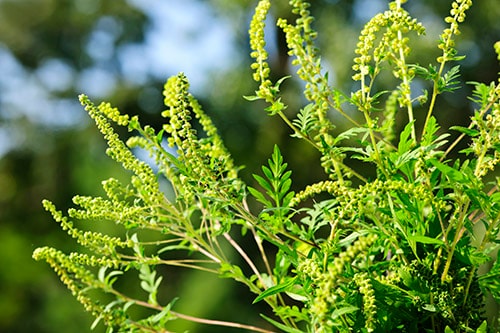Pollen and Your Health

Ragweed is one of the highest pollen polluters. One plant can produce a billion grains of pollen each season. Ragweed is the primary contributor to fall season allergies.
What is pollen?
Pollen is the grains or tiny seeds of flowering plants, trees, and grasses. These seeds can be carried on the wind and can cause various symptoms, or none at all, in individuals who are exposed to them.
What health problems can pollen cause?
For people with hay fever, also known as “allergic rhinitis,” breathing in pollen can cause sneezing, congestion, and a runny nose. Pollen exposure can also result in “allergic conjunctivitis” in some individuals, causing red, watery, or itchy eyes.
Pollen exposure can also cause asthma attacks in people who have asthma and for whom pollen is an asthma trigger.
How can I protect myself against pollen?
If you are allergic to pollen, or if you have asthma you can take steps to protect yourself:
- Check pollen forecasts on local news and online sources and plan to spend less time outdoors when pollen levels will be high.
- Take your allergy and/or asthma medications as prescribed by your health care provider.
- Don’t touch your eyes while you are outside, and wash your hands when you go back inside (before you touch your eyes).
- Shower after being outside to remove pollen from your skin and hair.
- Change your clothes after being outdoors.
- Keep windows closed during pollen season.
- Use high-efficiency filters in your home’s heating, ventilation, and air conditioning (HVAC) system. Make sure your HVAC system can use high-efficiency filters and that they don’t violate the system’s warranty.
How is climate change affecting pollen levels?
Our changing climate has caused shifts in precipitation patterns, more frost-free days, warmer seasonal air temperatures, and more carbon dioxide (CO2) in the atmosphere. These changes can affect:
- when the pollen season starts and ends and how long it lasts each year,
- how much pollen plants create and how much is in the air, and
- how pollen affects human health.
Some of these changes in pollen due to climate change could have major impacts on human health such as increasing individuals’ exposure to pollen and their risk of having allergy and/or asthma symptoms.